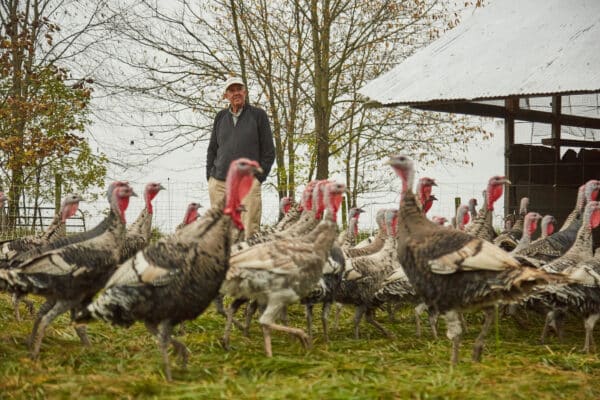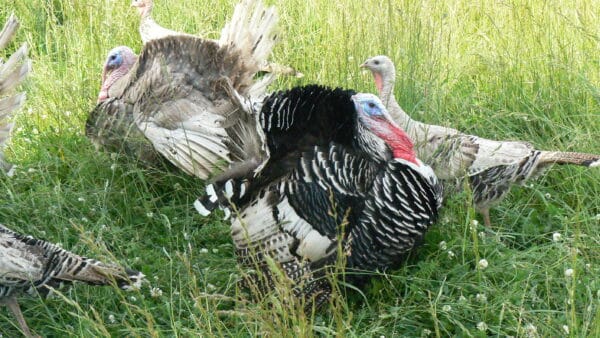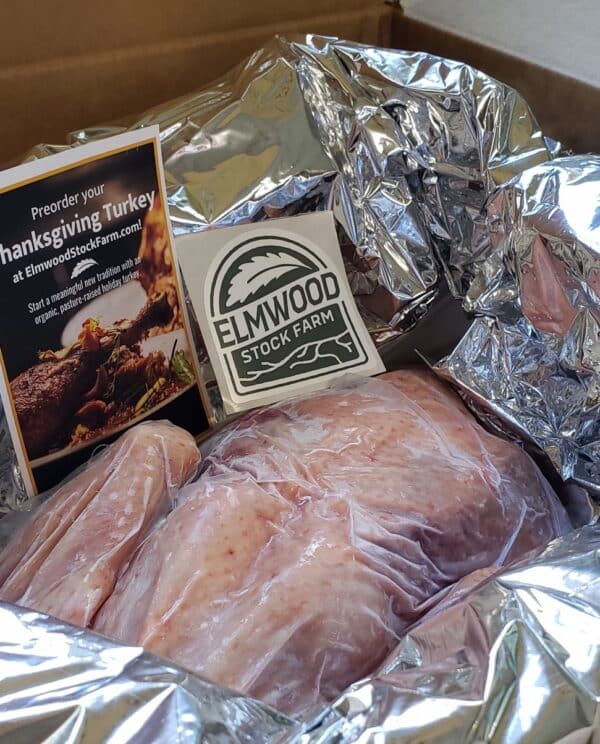
It’s that time of year again! With the holidays seemingly right around the corner, and all the hustle and bustle that’s sure to come, we’ve got just one thing on our minds – turkeys!
It’s no secret that we’re pretty proud of our certified organic, pasture-raised turkeys. It’s a pleasure to raise them from poults in an environment and manner that is matched most closely with their natural upbringing (where they can act like, well, turkeys!), and without the use of antibiotics, non-GMO grains, or synthetic chemicals. Seeing the final product grace your holiday dinner tables is an absolute honor and we are so grateful for your support.
We thought we would take this time to explain in more detail the two types of turkeys we have available and answer some commonly asked questions. We know you have lots of choices when it comes to where to shop for the holidays, but we’re confident that you can taste the difference when it comes to our offerings.
And remember, pre-orders for turkeys close on November 20! We offer pickup at the farm, at the Lexington and Hyde Park Farmers Markets, and we also ship nationwide!

It might surprise you to learn that there are many different types of turkeys, but here on our farm we raise both broad-breasted and heritage turkeys.
To start with, broad-breasted turkeys are similar to turkeys commonly sold at the supermarket and perhaps what you grew up eating. They have large frames, more white breast meat in relation to dark leg and thigh meat, and a rounder shape. However, the similarities end there. Our broad-breasted turkeys are what we call bronze, which simply means that they don’t have all white feathers like the ones found in stores. In addition, our broad-breasted turkeys being raised on pasture and purely organic feed (and without the use of fillers or chemicals) results in a much more flavorful result that is unlike anything you can find at the store. And did we mention the meat makes for great sandwiches the next day?
Meanwhile, our heritage turkeys are truly something special. These heritage turkeys are a rare breed and come from genetics developed in the first 200 years of domesticated turkey farming in the U.S. They’re much slower growing than turkeys bred at commercial farms that supply grocery stores, which made these turkeys fall into relative obscurity with the advent of industrialized farming, but we’re proud to be a part of the movement to bring these birds back from the brink of extinction. Being slow growers, the heritage turkeys are also much leaner, with a longer and thinner shape than their broad-breasted cousins. But that in turn results in a more equal dark meat to light meat ratio and a rich, juicy flavor and velvet-like tenderness that makes for a very special holiday meal indeed.
You can’t go wrong with either type of turkey and we are thrilled to be able to offer you, our customers, the opportunity to choose one that best suits you and your family this year.

Why does my turkey have dark spots on the skin?
These are feather freckles and are completely normal! The spots of pigmentation come from the multicolored, dark feathers found on the breeds of turkeys we raise here. Supermarket turkeys have white feathers and clear feather follicles, so the freckles are far less common. We prefer the taste of the darker-feathered birds and think you will too.
How should I cook my turkey?
First, make sure your turkey is completely thawed. In general, plan on 12 to 15 minutes of cooking time per pound at 325 degrees F. It’s easy to overcook turkey, especially a heritage turkey, so start checking for doneness ahead of when you think you should. Turkeys are done when the thickest part of the thigh registered a temperature of 165 degrees F.
Should I stuff my turkey?
We don’t recommend it. Stuffed turkeys take longer to cook and are at risk for overcooking and dryness. Turkeys also cook more evenly if you leave the body cavity more open to the hot air of the oven.
How long does cooked turkey last in the fridge?
The US Department of Agriculture states that cooked turkey will keep in the refrigerator for three to four days. After that, you can freeze the meat for awesome turkey leftovers well past the holidays! It’ll stay good in the freezer for two to six months.
How is my turkey safely shipped?
Your turkey will arrive freshly-frozen and vacuum-sealed from the butcher to your door. We ship in insulated shipping boxes using dry ice and sometimes frozen gel packs, depending on the shipping location, and we ship UPS Overnight or 2nd Day Air to minimize transit time and preserve the meat as much as possible. Remember, if your turkey box still contains dry ice upon arrival, be sure to wear gloves to remove and place the dry ice bag outside until the dry ice has completely dissipated.
Got more turkey questions? Post them in the comments below!


Made with 
